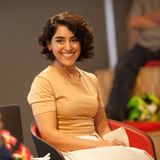A year after the Taliban takeover, it is undebatable whether a humanitarian catastrophe is unfolding in Afghanistan. Famine, a collapsed economy, denial of education for all women and girls and poverty in over 90 percent of the population are no longer forecasts, but harsh facts. To make matters worse, just before this Christmas the Taliban published a decree that bans most female staff from NGOs to do their work on the ground. These facts can make the conversations about Afghanistan feel defeating, but they also stress the importance of having a collective dialogue beyond knowledge exchange. What can we collectively do for the Afghan people, against all odds?
- After the event you are invited to stay for a drink, a browse around a small Afghan book market and a conversation with the speakers and moderator in the Pakhuis de Zwijger café.









More about the programme:
A Future for Afghanistan is a dialogue programme facilitated by organisations working on the ground in Afghanistan, partnered with Sahar Shirzad and Pakhuis de Zwijger. After a year of restrictive policy by the international community towards the Taliban and more and more prohibitive policies by the Taliban regime, it is clear that the Afghan people are paying the highest price. While observing how twenty years’ worth of development collapsed from a distance, we also feel the urgency to help, even though the circumstances have become more and more difficult. The recent Dutch parliamentary debate about Afghanistan clearly shows that new global issues are overshadowing and minimising the ambition to invest more in a future for Afghanistan.
The conversation includes voices of Afghanistan, as well as organisations working on the ground and the Dutch government. The focus of the conversation will be the future of the Afghan people in Afghanistan. What are the commitments the Dutch government can make, together with the diaspora and active organisations on the ground, in order for Afghanistan to have a dignified future? What is the responsibility of the international community?
About the speakers:
- Born in Afghanistan, Najeeb Azad and his family fled the country during the Taliban regime in 1999 due to ethnic persecution and lived his childhood as a refugee in Pakistan. He recently completed his postgraduate studies as the first Afghan recipient of European Commission’s scholarship on Education Policies for Global Development. Najeeb has previously worked with the United Nations, NGOs and academic institutions. As part of his political and education activism, he has spoken in various national and international events, organized panel discussions and photo exhibitions across Europe, and recently gave a TEDx talk to raise awareness about the situation in Afghanistan and the role of foreign policies of global states.
- Tania Akefi is an Afghan-Dutch poet, author and social activist. She will offer poetic guidance throughout the evening.
- Marriët Schuurman is director of the department of Stability and Humanitarian Assistance. In her previous position as special envoy for NATO on women, peace and security and as the Dutch Human Rights Ambassador she also developed extensive experience on the development and future of Afghanistan.
- Niloufar Rahim is a Doctor of Medicine, Family Medicine Resident and CD4D ambassador. Niloufar was the chair of Keihan foundation for two years: a platform for students and young professionals to support and implement projects in the field of education, integration and development cooperation in the Netherlands and Afghanistan. She was the leader of several Keihan medical projects in Afghanistan.
- Nasr Muflahi is the Country Director of Intersos Afghanistan, since January 2022. Over the last 20 years, he worked in challenging humanitarian contexts such as Syria, Iraq, Lebanon and Yemen, with, amongst others, UNOCHA, Action Contre la Faim, Norwegian Refugee Council, Islamic Relief Worldwide and International Rescue Committee.Nasr Muflahi has extensive experience in humanitarian representation, negotiation and dialogue with governments and other actors, focusing on emergency preparedness and response, improving humanitarian access and enabling returns of people who fled violent conflict.
- Mursal Sayas grew up in Kabul and studied management major at school in a German system. She has a bachelor’s in law and my master’s in IR (International Relations), studied defense law and had much training about human rights and education as a human rights value. She worked with AIHRC (Afghanistan Independent Human Rights Commission) for women’s units for three years. In addition, she interviewed and followed up on the cases of more than 3000 domestic violence victims. She used to write for BBC Persian, Etlaat-e-Rooz, Subh-e-Kabul, and other websites. Mursal left Kabul last August and started working as a freelancer with the famous French newspaper Courier International. Mursal is writing a creative none fiction book based on her experience with AIHRC.
- Anne Marie Kueter is senior programme manager for Save the Children Netherlands and responsible for several humanitarian projects funded by the European Union (ECHO), including a large multisectoral project in Afghanistan which Save the Children has been implementing since 2020. Her background is in the field of nutrition, she holds a Masters degree in Health and Nutrition from Wageningen University and started working in the field of humanitarian nutrition in 2012. She has worked in a number of countries including Myanmar, South Sudan, Mali, Yemen, and Bangladesh. Anne Marie visited Afghanistan early November.
- Romain Malejacq is an Associate Professor at Radboud University’s Department of Political Science and Centre for International Conflict Analysis and Management (CICAM), in Nijmegen (Netherlands) and holds a PhD in political science from Northwestern University (United States) and Sciences Po Paris (France). His first book, Warlord Survival: The Delusion of State Building in Afghanistan, came out with Cornell University Press in December 2019. His new research project looks at rebel-to-state transition in Afghanistan and beyond and was recently awarded a VIDI grant from the Dutch Research Council (NWO). His work has been published in journals such as Security Studies, Perspectives on Politics, Civil Wars, Small Wars & Insurgencies, the Canadian Journal of Political Science, and Etudes Internationales, and featured on blogs and mainstreamed media such as Political Violence at a Glance, The Conversation, Foreign Policy, and The Washington Post‘s Monkey Cage.Romain Malejacq also frequently appears in the media (e.g. Al Jazeera, NPR, France 24, France Info, France Culture).
- Dr. Farkhondeh Akbari is a postdoctoral research fellow at Gender, Peace, and Security Centre, at Monash University, Australia. Her research focus is on diplomatic engagement with non-state armed actors, peace settlement negotiations and women, peace and security. Dr Akbari obtained her PhD in diplomatic studies from the Australian National University. Her thesis examined the required characteristics for non-state armed actors to engage meaningfully in diplomacy for peace settlements and looked at the cases of the Taliban in Afghanistan and the Khmer Rouge in Cambodia. She has work experience at the Department of Political Affairs at the United Nations Headquarters in New York, the Afghanistan Independent Human Rights Commission and the Afghanistan Independent Directorate of Local Governance in Kabul.
Dr. Akbari is co-founder of the Organization for Development Solutions (ODS), a grassroots NGO taking a bottom-up approach to development and peacebuilding in Afghanistan. She is also an activist, using her research to advocate for human rights – especially the rights of women and girls and the plight of the Hazara people in Afghanistan.










